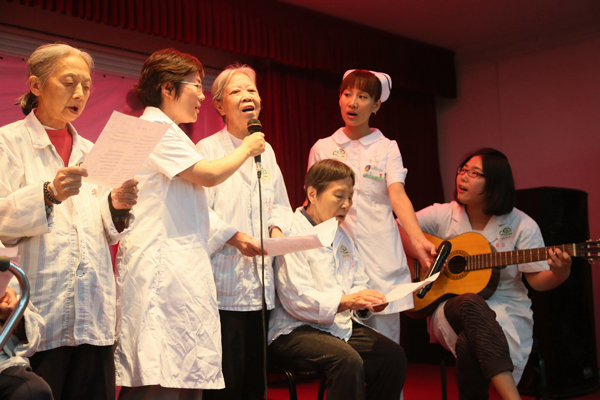Care in short supply for patients in need
Updated: 2013-10-07 23:30
By Wang Qingyun (China Daily)
|
|||||||||||
|
 |
|
Senior patients at Beijing Geriatric Hospital attend a singing performance on Sept 17 after undergoing rehabilitation courses, including music therapy. Wang Haixin / For China Daily |
Qi Zheng, 57 and retired, used to care for her 82-year-old father who has dementia.
As the only child of her parents, and with her mother having cancer, she found the burden too hard for her to bear, and she wanted to send her father to a place that offers professional treatment and care.
It was not easy.
"Most homes for the elderly I contacted don't offer professional medical care. For those that do, the waiting line for a bed is forever," she said.
But she was lucky. In 2011, she finally got her father into Beijing Geriatric Hospital, the only hospital in the city that runs wards specifically for senior dementia patients. And her father has been in the hospital since then.
"None of the other hospitals is willing to take him as their wards are full of patients with acute diseases," Qi said.
Dementia is common among elderly people. It is not merely a problem of memory: It reduces the ability to learn, reason or recall past experience, and there is also a loss of thoughts, feelings and activity. Many dementia patients have depression and anxiety.
Lyu Jihui, a director at the dementia unit of Beijing Geriatric Hospital, said more and more people are trying to send their ailing family members to such a hospital.
There are now 78 people staying in the unit, though it was designed to hold only 60 beds.
"The unit was designed for patients with serious complications or mental health symptoms. It also provides rehabilitation courses, including music therapy and cognitive training," Lyu said.
A patient on average stays for about a month, but some who need consistent medical care may stay for several years.
"Every patient here is diagnosed with six to eight health problems, so their treatment goes beyond dementia," Lyu said.
Zhang Shouzi, Lyu's colleague, said family members of many patients refuse to take them home even after the patients' conditions stabilize, because finding a place that can handle the patients is so difficult.
The situation is the same at Huilongguan Hospital, a mental health hospital in Beijing.
Shang Lan, director of the hospital's geriatrics department, said many patients would like to stay as long as possible.
"We ask their family members to take them back when their symptoms are stable, but they are reluctant to do so," Shang said.
Shang said she has seen an increase in dementia patients since 2001 when she started work at the department.
Now, more than 20 percent of the 175 patients in her department have dementia, compared with 13 to 15 percent in 2001.
"Many dementia patients are waiting to get in because of a shortage of beds," she added.
Cao Sujuan, deputy head of Beijing No 1 Welfare Home, said many homes for the elderly refuse to take in such patients because it is hard for them to hire staff to take care of the patients, who can sometimes become violent, which also means more risks and costs for the organizations.
Na Na, manager of Yiyangnian Senior Care, a privately owned home for the elderly in the Shijingshan district of Beijing, agreed with Cao.
"From what I know, publicly funded care centers for the elderly don't take in such patients," she said.
Both Shang and Zhang said it is better for dementia patients to be taken care of at home by family members because changes in the patients' living environment are likely to worsen their conditions.
However, people like Qi may find it difficult to do so.
"My father's condition deteriorated quickly. He needs close attention every minute," she said, adding that once her father turned on the gas oven to try to dry his socks but ended up burning them.
"I really hope there are more facilities that offer quality service for people like my father," she said.
Related Stories
Finding dementia years before tests 2013-08-11 08:07
Scientists find smoking-dementia link 2013-02-21 13:25
Daily prayer might reduce risk of dementia: study 2012-07-27 09:02
Taking on dementia in a familiar setting 2012-05-06 07:43
Report: Dementia not being identified early enough 2011-09-19 13:43
Most cases of dementia are not diagnosed 2011-09-13 13:39
Today's Top News
China warns US, Japan, Australia over sea issues
US on path to default if Obama won't negotiate
Male teachers needed in preschools
Direction charted to resolve disputes
At least 51 dead in Egypt clashes
China, NZ pledge to further ties, cooperation
Chinese, Australian leaders pledge to boost ties
US forces conduct twin raids in Libya, Somalia
Hot Topics
Lunar probe , China growth forecasts, Emission rules get tougher, China seen through 'colored lens', International board,
Editor's Picks

|

|

|

|

|

|





